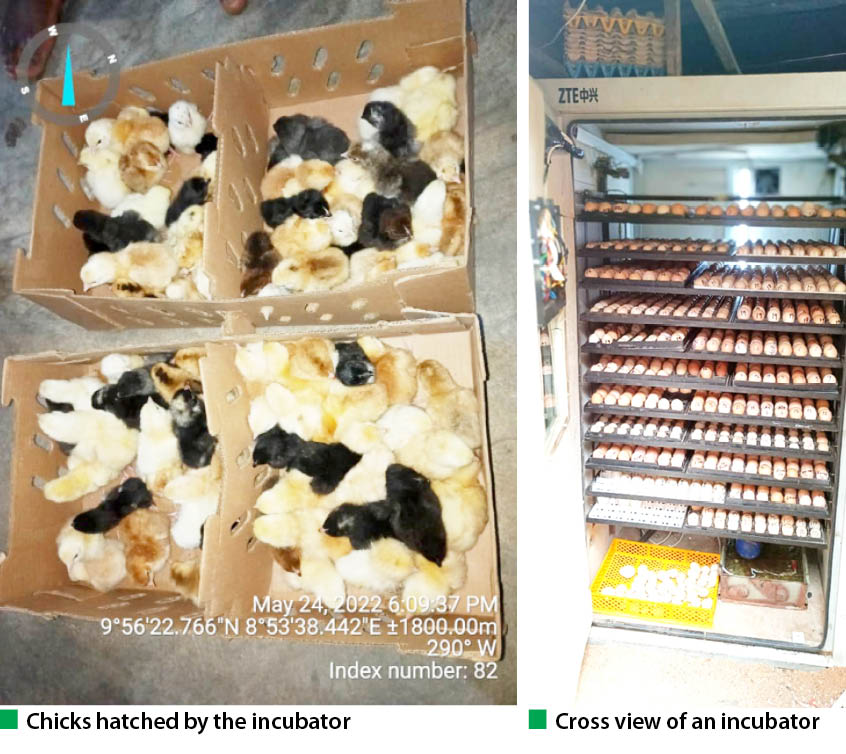The business of hatching which involves the use of certain devices – incubator, hatcher and brooder,has been considered viable and profitable with many Nigerians eager to venture into it due to its vast market demand. But due to the declining and, in most cases non-existent nature of electricity in Nigeria, of which the foreign incubators rely on to function, many have been struggling to remain in the business. However, with the invention of the locally-made incubator that can be powered by electricity and cooking gas, some hatchers have expressed satisfaction over the development, saying the new invention would revive and improve the business in the country. Daily Trust on Sunday reports.
Soon after he graduated as an agric engineer from the Bayero University, Kano, Abubakar Sani, a resident of Bauchi Road in Jos North Local Government Area of Plateau State, never believed that government job would be a sustainable source of income. He, therefore, thought of an alternative source of income that would provide him with the basic necessities of life and make him successful.
Thinking of a problem associated with a setter and hatcher as components of an incubator and developing a solution to remove obstacles to achieve an ultimate goal was what gave him the idea of what to do concerning the process of hatchery.
- 4 months after commissioning, mother-child hospital yet to take off in Benue
- How unmarked vehicles rule Nigerian roads
“Understanding a problem of whatever kind is often the first step to solving it. Looking for a means of survival after university life was what compelled me to think deeper on how to construct an incubator that could match foreign ones,” he said.
Sani, who graduated in 2013, said that after studying the problems associated with an incubator, he believed there was an opportunity for him to make a living from developing solutions to obstacles related to it.
He further said, “In Nigeria, there are countless foreign incubators everywhere but they cannot be sufficiently utilised because of poor power supply. Business owners run almost at a loss due to the cost of diesel. As a result of that, I saw a problem and thought of solution. From there, I thought of constructing a locally made incubator, which hatchers eventually found to be effective.”
Describing how he constructed the incubator, Sani said the first thing he did was to look for an unused refrigerator, as well as use metal to construct something like a refrigerator, which would serve as a setter, where the eggs would be arranged for heating.
“When I developed the idea of constructing incubators, it wasn’t as if they were not available, but most of those imported relied solely on electricity. Since we do not have stable electricity in our country, we thought of an alternative source of heating the eggs. We thought of using the LPG cooking gas. We made several trials and eventually succeeded,” he added.
He said his incubator was constructed in such a way that it would work with both electricity and cooking gas, adding that once electricity is disrupted, the incubator would automatically pick up, using the gas and can heat up the eggs as expected.

“In the hatchery business, if you cannot hatch up to 20,000, 40,000 or 50,000 eggs, you must shut down the business because of high cost of diesel. Many shut down their businesses because they could not afford to buy diesel to power their incubators. But with our type of technology (using the gas), our clients are served better because the gas does not run continuously. It is based on request.
Sani also said his incubators had been widely accepted by clients from different states, adding, “I built them for people from different states of the country, and gradually, my product became widely accepted.
“Whenever I construct one for someone, they would ask me to do another one. This tells you that they enjoy the product despite that it is being constructed in Nigeria.
“Initially, I didn’t hatch and sell eggs; I only built incubators for people, but some of my customers advised me to engage in the hatchery business. I considered the advice because I thought that by doing so I would satisfy my customers more. So I built one incubator for myself. Later on, I built another one; and within nine months, I ran seven incubators in my house.
“We are planning to build new incubators that would use solar energy and save more cost for our clients, especially now that cooking gas is very expensive.”
He recalled that when he built his own incubators, a kilogram of cooking gas was between N280 and N300, but now, it is N800, and no one knows what would happen in the future.
“That is why we have started thinking of an alternative to gas. Solar energy can equally give the required heat to the incubator for the eggs.
“As I am talking to you, I have started building the system, which will soon be automated so that during the daytime it would use solar and either electricity or gas during the night. That will be achieved very soon,” he added.
Some farmers who have started using the locally made incubators told Daily Trust Saturday why they preferred it to foreign ones.
Karima Hassan, a poultry farmer, said she had been using the locally made incubator for more than a year and had been enjoying it, adding that it does not give her problems. According to her, it also has more advantages when compared to the foreign ones she used before.
She said, “Honestly, I abandoned the foreign type for many reasons. Poor electricity supply is one of the challenges we face in this business; and we have realised that it is not something that can be solved soon. And you can’t run this type of business without adequate power supply.”
She also said that in addition to poor power supply, the amount of unit a farmer is required to buy to be able to adequately heat the eggs was always challenging.
“If you put the amount of money for the unit in an hour together, that is not easy. You will be running at a loss.
“Added to that, the cost of diesel now is very high. We can’t continue to buy a litre of diesel at an exorbitant price and expect a reasonable gain. If you engage in a business that you cannot gain anything, it is better you forfeit it, if not, you will be running at a loss.
“In my case, I don’t use electricity at all. So relatively, even with the current cost of gas, it is still better than the foreign ones. That is why, when the locally made incubator was introduced to us, we went for it and abandoned the foreign type. The local incubator has an alternative source of power, such as the cooking gas, unlike the foreign type. This is one of the greatest advantages of the local incubator,” she said.
Karima further explained that the locally made incubator was very effective as it hardly developed problems.
She said, “It works well and always gives the required heat for hatching. Once the amount of heat needed is provided, the incubator puts off the supply of gas until the need arises and it would continue.
“But when you use electricity and power is interrupted, you can imagine how long it would take to be restored. If there is no alternative you are at the risk of losing the eggs. For the local one, once electricity is disrupted, it will switch automatically to gas. So, with or without electricity, you can use it. It is very effective. I have been recommending it to people because I have both foreign and locally made incubators and know the difference.”
Dr Umar Sani, another user of the local incubator, also said he abandoned the foreign type because of inadequate power supply and the running cost of the device.
He said hatching required a constantly regulated environment (temperature), such that if there’s no power for one or two hours, the eggs would get rotten because the temperature would drop, and as a result of that, the farmer would run at a loss, which discourages him/her from continuing the business.
“The locally made incubator has helped us a lot. Now, you can use gas and hatch your eggs without any fear; that is why we abandoned the foreign one. We never expected this technology soon.
“Before the discovery of the local incubator, if you really wanted to engage in the business you would order chickens from Ibadan in Oyo State, from where you would take it to the North. It was always expensive. In some cases, the chickens would die on the road. And you could not put on a generator because you could not afford to buy diesel.
“The local incubator has reduced lots of difficulties for us. You can now hatch at small and medium scales. We thank God for the new technology,” he said.

 Join Daily Trust WhatsApp Community For Quick Access To News and Happenings Around You.
Join Daily Trust WhatsApp Community For Quick Access To News and Happenings Around You.


